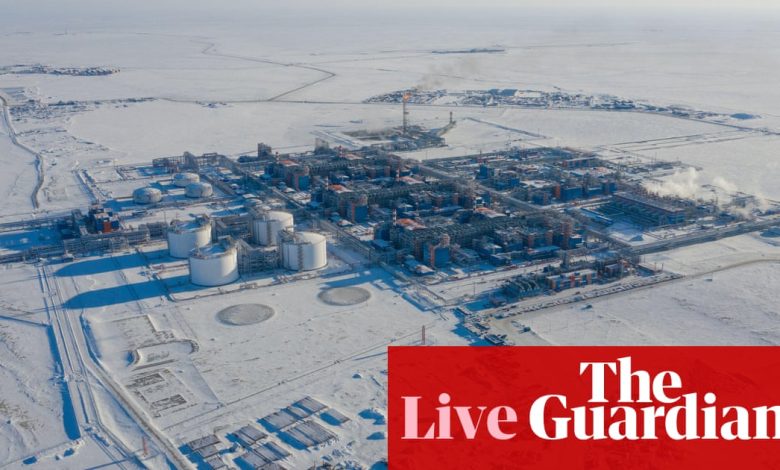Russia-Ukraine war live: EU targets Russia’s ‘shadow fleet’ in new round of sanctions against Moscow | Ukraine

[ad_1]
EU targets Russia’s ‘shadow fleet’ in new round of sanctions against Moscow
The EU has agreed a new package of sanctions against Russia over its war in Ukraine.
Among the measures is the targeting of Moscow’s shadow fleet of tankers moving liquefied natural gas (LNG) through Europe. They often lack proper insurance and have opaque ownership, according to reports.
The EU estimates that about 4-to-6 billion cubic meters of Russian LNG was shipped to third countries via EU ports last year. Russia is suspected of running the fleet to evade sanctions and keep up the flow of energy earnings so that it can finance the war.
The EU council said in a press release:
For the first time, the EU has adopted a measure targeting specific vessels contributing to Russia’s warfare against Ukraine, which are subject to a port access ban and ban on provision of services.
These vessels can be designated for various reasons such as the transport of military equipment for Russia, the transport of stolen Ukrainian grain, and support in the development of Russia’s energy sector, for instance through the transport of LNG components or transshipments of LNG.
This measure also targets tankers part of Putin’s dark fleet which circumvent the EU and Price Cap Coalition’s caps, while adopting deceptive shipping practices in complete disregard of international standards. 27 vessels were targeted today on these grounds.
Last month, the UK imposed its first sanctions targeting vessels in Vladimir Putin’s “shadow fleet” that it said was used to circumvent western sanctions on the trade in Russian oil.
Several companies were also added to the EU’s list on Monday, including a number of them in China, Turkey and the United Arab Emirates. Many are accused of circumventing sanctions or providing sensitive equipment to Russia.
📣 The EU has adopted new economic and individual sanctions against Putin’s regime and those who perpetuate his war of aggression against Ukraine.
These measures target the energy, finance, transport and trade sectors and make sanctions circumvention more difficult.
More ⬇️
— EU Council (@EUCouncil) June 24, 2024
Key events
Ukraine claims it destroyed Russian drone base – report
Ukraine has said that satellite pictures show the destruction of a Russian warehouse used to launch drones and to train cadets, BBC News reports.
The photos – posted by Ukraine’s Navy – follow reports of a massive explosion near a Russian airfield in the southern region of Krasnodar.
Moscow has yet to comment on the reports, but did say it has shot down a number of drones in the region overnight on Friday.
Navy officials in Kyiv said a number of training instructors and cadets learning to operate the Iranian-made Shahed drones were killed by the attack, which they said happened on Friday night.
In a post to Telegram, Navy officials in Kyiv said the operation was planned and conducted in partnership with Ukrainian intelligence agencies.
The base sat on the Sea of Azov opposite the occupied Ukrainian city of Mariupol, data from Planet Labs – the US-based company who took the photos – showed.
Here are some of the latest images coming out from the newswires:
Russia summons US ambassador over Crimea missile strike
Russia’s foreign ministry summoned the US ambassador on Monday to tell her that Moscow blamed Kyiv and Washington equally for a deadly missile attack on the city of Sevastopol in Crimea.
“Such actions by Washington … will not be left without response,” the ministry said in a statement. “There will definitely be response measures.”
The defence ministry in Moscow said US specialists had set the Atacms missiles’ flight coordinates on the basis of information from US spy satellites, meaning Washington was directly responsible (see post at 10.27 for more details).
Ukraine’s state security service (SBU) said it had detained a “mole” spying for Russia who passed on information about Ukrainian troop positions on the border with Belarus.
The SBU wrote on Telegram:
At the instruction of the occupiers (Russian military), the ‘mole’ established the locations of fortified areas and the approximate number of Ukrainian troops defending the border with Belarus.
He also tried to transmit the coordinates of warehouses with weapons and ammunition of the armed forces of Ukraine in the region.
The man had been promised to be “evacuated” to Russian-occupied territory in return for carrying out the assignment, the state security service added. These claims have not been independently verified by the Guardian.
EU targets Russia’s ‘shadow fleet’ in new round of sanctions against Moscow
The EU has agreed a new package of sanctions against Russia over its war in Ukraine.
Among the measures is the targeting of Moscow’s shadow fleet of tankers moving liquefied natural gas (LNG) through Europe. They often lack proper insurance and have opaque ownership, according to reports.
The EU estimates that about 4-to-6 billion cubic meters of Russian LNG was shipped to third countries via EU ports last year. Russia is suspected of running the fleet to evade sanctions and keep up the flow of energy earnings so that it can finance the war.
The EU council said in a press release:
For the first time, the EU has adopted a measure targeting specific vessels contributing to Russia’s warfare against Ukraine, which are subject to a port access ban and ban on provision of services.
These vessels can be designated for various reasons such as the transport of military equipment for Russia, the transport of stolen Ukrainian grain, and support in the development of Russia’s energy sector, for instance through the transport of LNG components or transshipments of LNG.
This measure also targets tankers part of Putin’s dark fleet which circumvent the EU and Price Cap Coalition’s caps, while adopting deceptive shipping practices in complete disregard of international standards. 27 vessels were targeted today on these grounds.
Last month, the UK imposed its first sanctions targeting vessels in Vladimir Putin’s “shadow fleet” that it said was used to circumvent western sanctions on the trade in Russian oil.
Several companies were also added to the EU’s list on Monday, including a number of them in China, Turkey and the United Arab Emirates. Many are accused of circumventing sanctions or providing sensitive equipment to Russia.
📣 The EU has adopted new economic and individual sanctions against Putin’s regime and those who perpetuate his war of aggression against Ukraine.
These measures target the energy, finance, transport and trade sectors and make sanctions circumvention more difficult.
More ⬇️
— EU Council (@EUCouncil) June 24, 2024
The Kremlin has blamed the US for a Ukrainian attack on Crimea with Atacms missiles that reportedly killed at least four people, including two children, and injured 151 more, and said there would be consequences. Neither Ukraine or the US has commented on the attack.
Kremlin spokesperson Dmitry Peskov called the attack “absolutely barbaric” and said Moscow would react to the US’s involvement in it, Reuters reported.
His comments come after the defence ministry in Moscow said US specialists had set the Atacms missiles’ flight coordinates on the basis of information from US spy satellites, meaning Washington was directly responsible.
Last month, Joe Biden allowed Ukraine to use some US-made weapons over one part of the Russian border, to allow Kyiv’s forces to defend against an offensive aimed at the city of Kharkiv, relaxing an important constraint on Ukraine’s able to defend itself.
Officials stressed, however, that limits on the use of US long-range weapons such as the army tactical missile system (Atacms) would remain in place.
EU foreign affairs chief Josep Borrell has told Georgia that its push to join the bloc could be ended, as Brussels weighs options to punish the authorities over a “foreign influence” law.
At a meeting of EU foreign ministers in Brussels, he said:
The door for Georgia to become a member of the European Union is open.
But if the government continues on the same track, continues doing what they are doing, this door will be closed, and the Georgian people will pay the consequences, will suffer.
The ruling party in the South Caucasus country – which formally became a candidate to join the EU last year – adopted a controversial “foreign influence” law this month that critics say is modelled on Russian legislation used to stifle dissent.
The bill obliges civil society organisations and media that receive more than 20% of their revenues from abroad to register as “organisations serving the interests of a foreign power”.
Despite the moves from the government, the population in the country remains overwhelmingly in favour of moving closer towards the EU.
Borrell said that initial moves being discussed by ministers could include halting funding for Georgia’s security forces, cutting government financing, or severing high-level contacts.
“We don’t want to affect civilians. We don’t want to put more pain on the civilian people,” Borrell was quoted by Agence France-Presse (AFP) as saying.
Estonian foreign minister Margus Tsahkna said there would also be discussions on Schengen visa bans for high-ranking Georgian officials.
Tsahkna said:
The situation for Georgia is serious, and all the responsibility lies on the shoulders of the Georgian government. The Georgian people are supporting the way to the European Union.

Pjotr Sauer
Ukrainians are having to cope with widespread emergency blackouts as Russia continues to pound critical infrastructure.
In recent months, Moscow has intensified its attacks on Ukraine’s energy grid. On Friday night, energy facilities came under a “massive attack”, Ukraine’s energy ministry said. Several workers were injured as a result of shelling at one of the facilities.
“The situation in the energy sector remains difficult,” the ministry said in a statement on Saturday.
Volodomyr Zelenksiy said this month that Russia had damaged or destroyed more than half of Ukraine’s power generation, causing the worst rolling blackouts since the full-scale invasion in 2022.
Olga Stefanishyna, the deputy prime minister for European and Euro-Atlantic integration, has said that Ukraine is on an “irreversible” course of western integration after the EU agreed to formally start entry negotiations this week.
“This is the utmost will of the Ukrainian people. And this is the irreversibility. And you’ve seen Ukrainians stand up for their choice,” Stefanishyna, who will head the opening of the accession talks in Luxembourg tomorrow, said in Kyiv on Sunday.
EU member countries agreed on Friday to start entry talks with Ukraine and Moldova – overcoming vocal opposition from Hungary which takes over the EU’s rotating presidency from Belgium on 1 July. The process of joining varies for each country but could take years. Turkey started its accession talks almost two decades ago and is still waiting for full membership.
Kyiv applied for EU membership in the weeks after Russia launched its full-scale invasion in February 2022 and it was granted candidate status four months later.
The Ukrainian government has been implementing sweeping reforms recommended by the EU, including anti-corruption measures, regulations for public administration and improvements in food safety standards.
The death toll from Sunday’s attacks in the southern Russian region of Dagestan has risen to 19 people, Russia’s investigative committee said on Monday.
Gunmen opened fire in two cities in Russia’s north Caucasus region of Dagestan, targeting a synagogue, two Orthodox churches and a police post, according to Russian media.
In the city of Derbent, gunmen attacked a synagogue, home to a Jewish community in the predominantly Muslim region. Russia’s state media Tass said the attackers also shot at two nearby Orthodox churches, killing a police officer and a priest.
In a separate shooting which occurred simultaneously, a group opened fire on police in Makhachkala, the capital of Dagestan, located about 75 miles north along the Caspian Sea coast. According to local authorities, at least one police officer was killed. You can read the full report by my colleague, Pjotr Sauer, here.
Ukraine will get the first tranche of military aid from frozen Russian assets next week, EU foreign policy chief says

Jennifer Rankin
Jennifer Rankin is the Guardian’s Brussels correspondent
Ukraine will get the first tranche of military aid from frozen Russian assets next week, after officials devised a workaround to avoid a Hungarian veto, according to the EU’s top diplomat.
Josep Borrell, the EU’s high representative for foreign and security policy, said Ukraine would get the first tranche of money from revenues from Russia’s frozen assets next week, following “a legal procedure to avoid any kind of blockage”.
The EU agreed in May to seize an estimated €4.4bn interest on €191 bn Russian assets immobilised by western sanctions that have been frozen inside the union, at Belgium’s Euroclear. The money will fund weapons and aid for Ukraine, spread over several payments.
The legal procedure to avoid a Hungarian veto could help unlock a G7 plan to lend Ukraine $50bn based on the frozen assets.
Speaking to reporters ahead of a meeting of EU foreign ministers this morning, Borrell said the money would come next week.
He said:
I cannot have this money in my pocket. This money is for military support for Ukraine and the decision has to be taken immediately avoiding any kind of blockage.
We have these revenues coming from the frozen assets and we have to look for a way in order to use them, avoiding any kind of blockage.
We have a process in order to make this work quickly. The first tranche of money will come next week, in July. The second will come some months later. Ukraine needs more help and needs more help now before the summer.
Hungary’s Kremlin-friendly government is blocking six decisions to aid Ukraine and officials want to avoid the plans for the frozen assets being caught in the same veto.
As we mentioned in the opening summary, a Russian attack on Ukraine’s southern city of Odesa is reported to have struck civilian infrastructure. Regional governor, Oleh Kiper, has now said the attack injured at least three people on Monday morning.
A 19-year-old boy and two middle-aged men were taken to hospital, he wrote on Telegram.
The air force had warned the city’s residents of the threat of incoming missiles before the explosions sounded, Reuters reported.
Odesa, one of Ukraine’s biggest ports, has long been a target of Russian attacks, especially after Moscow quit a UN-brokered deal last year that had allowed safe passage for Ukrainian grain shipments via the Black Sea.
Opening summary
Hello and welcome to the Guardian’s live coverage of the war in Ukraine. The time has just gone past 10:35am in Kyiv.
Russia claimed on Sunday that the US was responsible for a Ukrainian attack on the Russian-annexed Crimean peninsula in which five US-supplied missiles that killed four people, including two children, and injured 151 more. These figures have not been independently verified by the Guardian.
The defence ministry in Moscow said US specialists had set the Atacms missiles’ flight coordinates on the basis of information from US spy satellites, meaning Washington was directly responsible.
The ministry said:
Responsibility for the deliberate missile attack on the civilians of Sevastopol is borne above all by Washington, which supplied these weapons to Ukraine, and by the Kyiv regime, from whose territory this strike was carried out.
The US began supplying Ukraine with longer range Atacms missiles, which have a 300-kilometre (186-mile) range, earlier this year.
Here are some of the other main developments:
-
A Russian attack on Ukraine’s southern city of Odesa on Monday struck civilian infrastructure and caused casualties, the region’s governor said. Ukraine’s interior ministry published photographs of a massive cloud of smoke rising from the site where emergency services were working to put out a fire.
-
Vladimir Putin thanked North Korean leader Kim Jong-un for his hospitality during the visit to Pyongyang last week which Putin said brought bilateral ties to an unprecedented level, the Kremlin said.
-
Senior officials of South Korea, the US and Japan condemned “in the strongest possible terms” deepening military cooperation between North Korea and Russia, saying Putin’s recent visit to Pyongyang triggered grave concern, a joint statement released by Seoul’s foreign ministry said on Monday.
-
A top North Korean military official criticised the US over its expanding military assistance to Ukraine, according to state media, KCNA. Pak Jong Chon reportedly said Russia has the “right to opt for any kind of retaliatory strike”, adding if Washington kept pushing Ukraine to a “proxy war” against Russia, it could provoke a stronger response from Moscow, and a “new world war”. He referred to comments by the Pentagon last week that Ukrainian forces can use US supplied weapons to strike Russian forces anywhere across the border into Russia.
-
One person was killed and three injured in Russia’s Belgorod region, bordering Ukraine, when three Ukrainian drones attacked the city of Grayvoron, regional governor Vyacheslav Gladkov said. Air defences overnight shot down 33 Ukrainian drones over Russia’s western Bryansk, Smolensk, Lipetsk and Tula regions, the Russian defence ministry said Sunday.
-
A new attack on Kharkiv killed at least one person and injured 11 others on Sunday, according to local officials. Mayor Ihor Terekhov said the city was attacked by a guided bomb and that around half of Kharkiv was without electricity because of the strike.
-
Ukrainians are having to cope with widespread emergency blackouts as Russia continues to pound critical infrastructure.
[ad_2]




